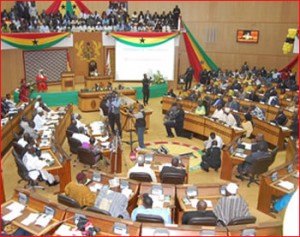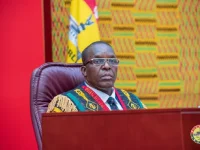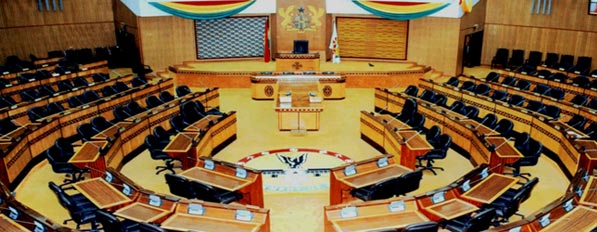 Parliament yesterday approved a loan agreement between the government of Ghana and VTB Capital PLC of London for $300 million to equip the Ghana Armed Forces (GAF) to enable them to effectively discharge their peacekeeping duties with the United Nations.
Parliament yesterday approved a loan agreement between the government of Ghana and VTB Capital PLC of London for $300 million to equip the Ghana Armed Forces (GAF) to enable them to effectively discharge their peacekeeping duties with the United Nations.
The sharp disagreements which usually characterise important issues on the floor of Parliament were witnessed again yesterday during the debate on the agreement.
The Minority raised questions with regard to the deal and suggested that it was somewhat shady. That culminated in a heated debate and a vote by the group against the agreement.
In spite of the protestations of the Minority, the Majority used its numbers to approve the deal.
The loan has a repayment period of three years, a grace period of two years, a five-year maturity period, a six-month labor, a seven per cent interest rate, a management fee of two per cent at draw down, a two per cent default rate, among other things.
Minority’s views
The position of the Minority, as articulated by its Spokesperson on Finance, Dr Anthony Akoto Osei, was that all the receivables that would accrue to the government between 2014 and 2018 would not be enough to service the loan.
He said even if the loan was approved, it could not be spent because any spending of the amount would result in government exceeding the amount approved in the Appropriations Act.
Perhaps what could be considered one of his most important objections was that VTB Capital was 61 per cent owned by the state of Russia. The same company was the lender, the arranger and the facility agent for the loan, something he considered strange.
The company is seeking to charge Ghana $5 million as fees upfront to manage the loan.
What was worse, in his view, the company had stated in the agreement that it would provide information on the deal but could not be held responsible for the accuracy, adequacy and completeness of the information it would provide, a service for which it would charge the country $6 million.
Solicitor General’s caution
Dr Akoto Osei also presented, in the course of his arguments, a letter dated April 1, 2014 and purportedly signed by the Solicitor General at the Attorney-General’s Office, Mrs Amma Gaisie, advising the government to be cautious in its bid to acquire the money.
In the said letter, which Dr Akoto Osei made available to the officers of Parliament, the Solicitor General had said that she could not ascertain the purpose of the loan, as the necessary accompanying documents were non-existent.
She also said the clause which stated that the lender would not monitor the activities of the borrower to ensure that the money was put to the use for which it was acquired was strange and a departure from the norm.
She, therefore, advised caution.
Dr Akoto Osei wondered how the government could ignore the advice of its legal officer and seek to go ahead with the deal.
He said the agreement, if signed as it was, would mean that after 2016, the government would have to pay $100 million a year to service the loan, which was tantamount to squeezing water out of stone.
The Member of Parliament (MP) for Akwapim North, Mr William Ofori Boafo, said the Minority supported any move to equip the GAF but the agreement appeared not to be transparent.
The Deputy Minority Leader, Mr Dominic Nitiwul, said the NPP group would never support a deal which looked fraudulent and had terms which were clearly exorbitant.
Dr Mark Asibey-Yeboah, the MP for New Juaben South, said not much was known about the lenders and suggested that they could be money launderers or drug dealers.
Majority views
The Minister of Foreign Affairs, Ms Hanna Tetteh, said Ghanaian soldiers could not continue to be in harm’s way while MPs quibbled over unimportant issues.
She said Parliament could not engage in needless arguments while Ghanaian soldiers remained in various theatres of conflict without the necessary arms and ammunition.
She urged the Majority to ignore all those unimportant comments and arguments and vote for the deal.
The Minister of Finance, Mr Seth Terkper, said it was unfortunate that the Minority had described VTB Capital, the company which had agreed to lend money to Ghana, in such unpalatable terms.
He said VTB Capital was credible and was registered in London, a city which did due diligence on all financial companies registered there.
The vote
During the voice vote to adopt the report of the Finance Committee on the loan, the Minority abstained.
They did so again during the consequential resolution to approve the deal.





